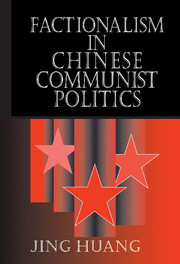Book contents
- Frontmatter
- Contents
- List of Figures and Tables
- Preface
- List of Abbreviations
- Introduction
- 1 Factionalism, the Puzzle of Chinese Communist Politics
- 2 Factionalism and the Political System in China
- 3 The Establishment of the Yan'an Round Table
- 4 The Transition of the Yan'an Round Table
- 5 Crises in Leadership Relations with the Two-Front Arrangement
- 6 The Collapse of the Yan'an Round Table and the Unleashing of Factionalism
- 7 Deng Xiaoping's Dominance: Factionalism Prevails over the Party Spirit
- 8 Conclusion
- Selected Bibliography
- Index
8 - Conclusion
Published online by Cambridge University Press: 11 September 2009
- Frontmatter
- Contents
- List of Figures and Tables
- Preface
- List of Abbreviations
- Introduction
- 1 Factionalism, the Puzzle of Chinese Communist Politics
- 2 Factionalism and the Political System in China
- 3 The Establishment of the Yan'an Round Table
- 4 The Transition of the Yan'an Round Table
- 5 Crises in Leadership Relations with the Two-Front Arrangement
- 6 The Collapse of the Yan'an Round Table and the Unleashing of Factionalism
- 7 Deng Xiaoping's Dominance: Factionalism Prevails over the Party Spirit
- 8 Conclusion
- Selected Bibliography
- Index
Summary
FACTIONALISM AND POLITICAL OUTCOMES IN CHINA
Factionalism, an Essential Dynamic in CCP Politics
The system of single-party dictatorship imposes a double dilemma on the CCP leaders. In order to maintain the image of the Party's unity, which is the prerequisite for its rule, they have to deny any differences among themselves in public, but differences are inevitable in the policy process; and they need support in a policy dispute, but they cannot generate support through an open debate because that would undermine the image of unity. This double dilemma has forced the CCP leaders to engage in factional activities: when a policy dispute emerges, they pass information and seek support through informal channels provided by guanxi (personal ties). Moreover, it has also brutalized CCP politics: the weaker ones must be victimized once the dispute breaks open, even though their policy preferences might be correct, because any compromises would expose the division within the leadership and hence undermine the image of unity. Thus, we have observed fierce factional activities whenever a policy dispute emerged among the CCP leaders, and those who had control of the strongest factional networks would prevail. Indeed, the extent of a CCP leader's power is measured essentially by his ability to manipulate factional activities in political affairs. Mao and Deng were, in this sense, the supreme leaders of their times, and Mao was a stronger leader than Deng in this respect.
- Type
- Chapter
- Information
- Factionalism in Chinese Communist Politics , pp. 411 - 428Publisher: Cambridge University PressPrint publication year: 2000



